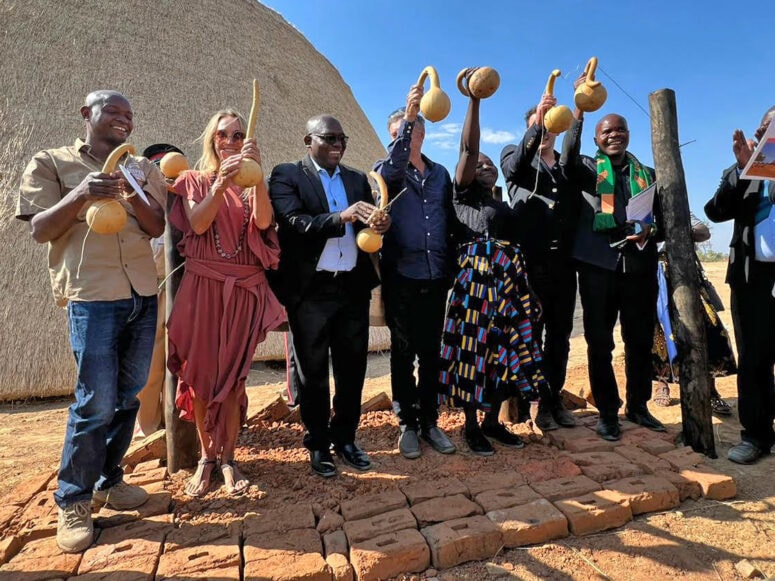Our Epicenter Strategy in Africa is an integrated approach to improving the lives of people facing hunger through health, education and agricultural programs designed and led by local community leaders. In Zambia, 1.18 million people are facing food insecurity due to extreme flooding, resulting from climate change, and the increase of food prices from the ongoing invasion of Ukraine. The World Food Programme indicated that Zambia’s malnutrition rates are highest among the world, with 48% of the population unable to meet their daily caloric needs.
The opening of the Mlawe Epicenter building is a timely and locally-led initiative to mobilize the community to access agricultural and health services as a step in their journey to self-reliance.
Over 12,000 community members from the Vubwi district in Zambia united on August 25, 2022 to celebrate the opening of the Mlawe Epicenter building. The Hunger Project-Zambia ushered in this five-year community-led development project, in close partnership with Heifer International, Restless Development and the Government of the Republic of Zambia.
The Mlawe Epicenter community-led development project is a huge achievement for the Vubwi district, in which the construction of the superb building will be used for agricultural, health, educational and entrepreneurial services.
Peter Simon Phiri, Eastern Province Minister of Zambia
Sustainable development has also been a key driver in the design of the epicenter buildings, especially the Mlawe Epicenter. Last year, The Zambia Institute of Architects announced Mlawe Epicenter by Kamuna Design Studio as the 2021 Sustainability Green response Project of the Year and Building Project. The epicenter building orientation and slopes are designed to maximize solar harvesting. Local materials and labor were used extensively in the build and all the bricks used on site were molded by the community. There was a deliberate drive to foster knowledge transfer to the local communities in all aspects of the build.
This project, funded generously by Patter Foundation with The Hunger Project-Australia, and a local team of Zambian architects designed the Mlawe Epicenter buildings, which will serve as a dynamic center for community members to mobilize for action. Over the last three years, community members have been effectively engaging in powerful workshops to take charge of their own development and leverage key programs including food & nutrition, health, women empowerment, water & sanitation, climate resilience and poverty reduction.
On behalf of my community, we are very excited about this initiative because we know it is changing people’s lives and it is going to support service provision for many people in our area. We, as a community, are committed to support this initiative as it’s the first of its kind in Zambia and will do anything that we need to do for it to succeed.
Chief Pembamoyo of the Vubwi community
Community-led development drives sustainability.
Our Epicenter Strategy focused on six specific objectives for Mlawe on their journey to self-reliance.
-
Strengthened rural communities that continuously set, achieve and sustain their own development goals
-
Empowered women and girls
-
Improved and sustained access to integrated water and sanitation facilities
-
Increased access to health clinic services (specifically for mothers, children and youths)
-
Empowered youth who are meaningfully engaged in community-led development
-
Improved community-led development partnership models that are scalable, inclusive and holistic..
Rising food prices have impacted the entire world, and especially here in Zambia, as families struggle to put enough food on the table. Here in Mlawe, we see hope. We see a stronger food system, with local food production and a community that is taking charge of their own future. Mlawe represents excellence in African food security, and now is the time to increase investment in community-led programs like the one we celebrate today, in Zambia and throughout the world. I would especially like to recognize our community leaders, the Government of Zambia, and THP-Australia with the incredibly generous Patter Foundation for this investment in Mlawe’s future.
Tim Prewitt, President and CEO, The Hunger Project
Inspired by the natural environment and vast mountain range that overlooks the community, the Epicenter was designed with three distinct peaks that symbolize the community’s ascent to achieve self-reliance and economic empowerment
Image: Zambia, 2022, Photo for The Hunger Project

